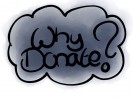In the run-up to Ireland’s Marriage Equality referendum on May 22nd, I’ve invited a series of guest posters– people from Ireland or who live here, of many different backgrounds and orientations- to share their thoughts on the referendum, the campaign, and what it means to them. Contributions to Guest Posts for Equality are welcome- drop me a message.
This post comes from Brian O’Flynn, from my own home town of Cork, Ireland.
In the course of this referendum debate there have been many complaints, in particular from the No side, about an undemocratic atmosphere of censorship. When No posters are defaced by unknown persons, they behave as if the Yes campaign had ordered an official strike. When a mural depicting two men embracing was permitted on George Street in Dublin, they behaved as though the government was conspiring against them to give the Yes campaign more publicity.
In short, they are trying to pin the actions of some rogue vandals on the entire Yes campaign, as well as attempting to politicise the everyday culture and celebrations of the LGBT community. We, as gay people, feel that we can no longer hold hands in the street without having someone from the No side present to “give balance” to the situation. In the process of indignantly claiming their democratic rights, they’ve virtually censored our lives and personal histories.
Just watch the very condescending infomercial released by Mothers and Fathers Matter. It claims that one cannot come out against SSM without suffering verbal abuse and accusations of homophobia; a profoundly unfair generalisation. The official No campaign are experts at playing the victim. Their strategy is to assume the role of the underdog, in the hopes that the Yes campaigners will be seen as extreme liberals who believe that free speech and democracy are less important than our feelings.
The end result is that we are supposed to believe that the No side are the defenders of democracy, balance and free speech in Ireland. But let’s examine just how “democratic” the No side are. Continue reading “Guest Posts for Equality: The No side’s warped understanding of democracy is a bad joke”




